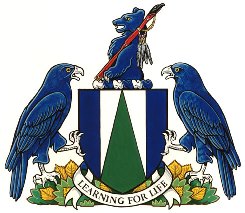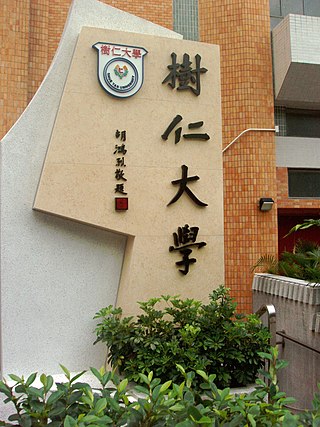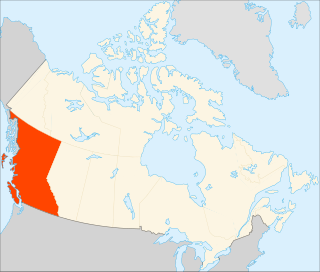
Education in Canada is for the most part provided publicly, and is funded and overseen by provincial, territorial and local governments. Education is within provincial jurisdiction and the curriculum is overseen by the province. Education in Canada is generally divided into primary education, followed by secondary education and post-secondary. Within the provinces under the ministry of education, there are district school boards administering the educational programs.

Athabasca University (AU) is a Canadian public research university that primarily operates through online distance education. Founded in 1970, it is one of four comprehensive academic and research universities in Alberta, and was the first Canadian university to specialize in distance education.
A registered education savings plan (RESP) in Canada is an investment vehicle available to caregivers to save for their children's post-secondary education. The principal advantages of RESPs are the access they provide to the Canada Education Savings Grant (CESG) and as a method of generating tax-deferred income.

The Ontario Student Assistance Program (OSAP) (French: Régime d'aide financière aux étudiantes et étudiants de l'Ontario ) is a provincial financial aid program that offers grants and loans to help Ontario students pay for their post-secondary education. OSAP determines the amount of money that a student is eligible to receive by considering factors such as tuition, course load, and the financial resources of the student. More than 380,000 students – more than half of all full-time students –received student financial aid in 2014-15.

The Elementary and Secondary Education Act (ESEA) was passed by the 89th United States Congress and signed into law by President Lyndon B. Johnson on April 11, 1965. Part of Johnson's "War on Poverty", the act has been one of the most far-reaching pieces of federal legislation affecting education ever passed by the United States Congress, and was further emphasized and reinvented by its modern, revised No Child Left Behind Act.

Hong Kong Shue Yan University is a private liberal-arts university on Braemar Hill, North Point, Hong Kong. Founded in 1971 as Hong Kong Shue Yan College (香港樹仁學院) by Henry Hu and Chung Chi-yung, it was unilaterally recognised as the first private university by the order of the Chief Executive on 19 December 2006. According to QS World University Rankings 2023, it ranked #351-400 in Asia, and #198 in Eastern Asia.

The Department of Education is the executive department of the Philippine government responsible for ensuring access to, promoting equity in, and improving the quality of basic education. It is the main agency tasked to manage and govern the Philippine system of basic education. It is the chief formulator of Philippine education policy and responsible for the Philippine primary and secondary school systems. It has its headquarters at the DepEd Complex in Meralco Avenue, Pasig.
Government sponsored Student Loans in Canada was designed to help post-secondary students pay for their education in Canada. The federal government funds the Canada Student Loan Program (CSLP) and the provinces may fund their own programs or be integrated with the CSLP. In addition, Canadian banks offer commercial loans targeted for students in professional programs.
The Canada Education Savings Grant (CESG) is part of a Government of Canada program, administered through Employment and Social Development Canada, to assist with savings for Canadian children's higher education. Under the CESG program, the government will contribute an amount to a Registered Education Savings Plan (RESP) according to a formula which is dependent on the amount contributed and the income level of the family making the contributions. As of 1 July 2005, the CESG is legislated by the Canada Education Savings Act.

Higher education in Ontario includes postsecondary education and skills training regulated by the Ministry of Colleges and Universities and provided by universities, colleges of applied arts and technology, and private career colleges. The current minister is Jill Dunlop who was appointed in June 2021. The ministry administers laws covering 22 public universities, 24 public colleges, 17 privately funded religious universities, and over 500 private career colleges. 18 of the top 50 research universities in Canada are in Ontario.

Newfoundland and Labrador has had the same growing pains as other provinces in developing its own form of education and now boasts a very strong, although relatively small, system. The direction of Newfoundland and Labrador's policy has evolved rapidly since the late 1990s, with increased funding, participation rates, accessibility and transferability. Many of the directives the government has been acting upon in the past 10 years have been a result of recommendations that stemmed from a 2005 white paper: Foundation for Success: White Paper on Public Post-Secondary Education. It set the course for furthering the strategic directives of the provincial post-secondary education sector. Some of its recommendations aimed to:

Higher education in Manitoba traces the development and expansion of higher or advanced education in the province of Manitoba.

Higher education in Alberta refers to the post secondary education system for the province of Alberta. The Ministry of Advanced Education in Alberta oversees educational delivery through universities, publicly funded colleges, technical institutions, and private colleges. These institutions offer a variety of academic and vocational pursuits. Students have access to post-secondary options through most regions of Alberta, and a developed articulation system allows for increased student mobility.

Higher education in Prince Edward Island refers to education provided by higher education institutions in the Canadian province of Prince Edward Island. In Canada, education is the responsibility of the provinces and there is no Canadian federal ministry governing education. Prince Edward Island has one university, the University of Prince Edward Island authorized to grant degrees, and two community colleges, Holland College, which operates centres across the province, and Collège de l'Île, which offers post secondary education in French. The governing body for higher education in Prince Edward Island is the Department of Innovation and Advanced Learning, headed by the Minister of Innovation and Advanced Learning, the Honourable Allen Roach.

Higher education in New Brunswick refers to education provided by higher education institutions in the Canadian province of New Brunswick. Higher education has a rich history in New Brunswick. The first English-language university in Canada was the University of New Brunswick. Mount Allison University was the first in the British Empire to award a baccalaureate to a woman, Grace Annie Lockhart, B.Sc. in 1875. Education is the responsibility of the provinces in Canada and there is no federal ministry governing it.

Higher education in Nova Scotia refers to education provided by higher education institutions. In Canada, education is the responsibility of the provinces and there is no Canadian federal ministry governing education. Nova Scotia has a population of less than one million people, but is home to ten public universities and the Nova Scotia Community College, which offers programs at 13 locations.

Higher education in the Northwest Territories traces the development and expansion of higher education in Canada's Northwest Territories. In Canada, education is a provincial or territorial concern and there is no national regulation nor accrediting body.

Higher education in British Columbia is delivered by 25 publicly funded institutions that are composed of eleven universities, eleven colleges, and three institutes. This is in addition to three private universities, five private colleges, and six theological colleges. There are also an extensive number of private career institutes and colleges. Over 297,000 students were enrolled in post-secondary institutions in British Columbia in the 2019-2020 academic year.

The Canada Learning Bond (CLB) is a grant paid by the government of Canada to assist low-income families with saving money for their children's post-secondary education. The CLB relies primarily on the National Child Benefit (NCB) program to determine which families may be eligible and the tax regulations for the Registered Education Savings Plan (RESP) to guide the eventual use of the CLB funds. As of 1 July 2005, the CLB is legislated by the Canada Education Savings Act.
Higher education accreditation is a type of quality assurance process under which services and operations of post-secondary educational institutions or programs are evaluated to determine if applicable standards are met. If standards are met, accredited status is granted by the agency.
















